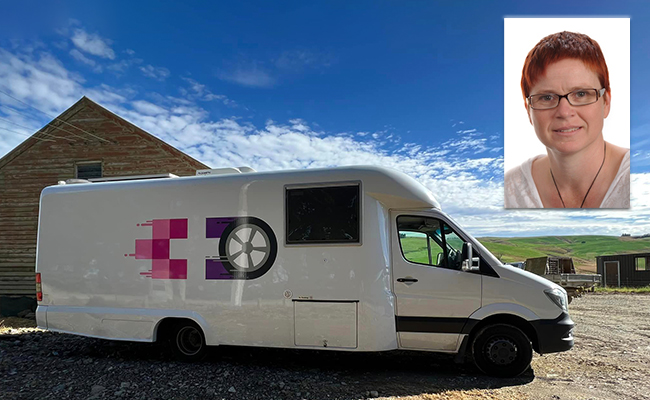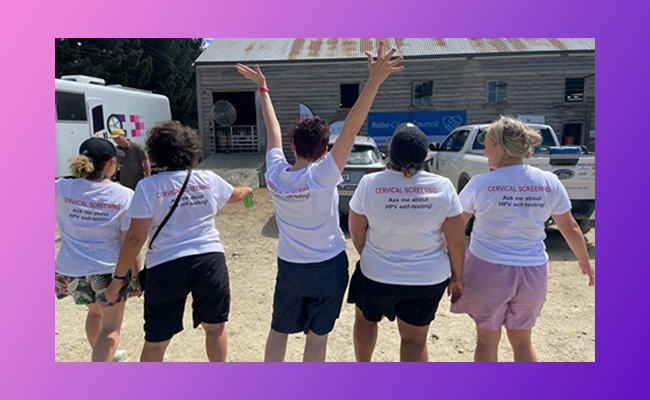Friday 12 May 2023 1:21pm

Te Waka Wahine Hauora – the Women’s Health Bus arrives at SHEAR 4 A CAUSE 24hr Shearathon in Moa Flat, ready to provide their services during the event. Inset: Dr Helen Paterson
A health bus is travelling thousands of kilometres around Otago and Southland hoping to lead the way in ending cervical cancer for rural Aotearoa New Zealand.
Te Waka Wahine Hauora – the Women’s Health Bus is the only one of its kind in Aotearoa. Known affectionately as Betty, this mobile service provides sexual and reproductive care, including cervical screening and colposcopies, at clinics in Otago and Southland towns such as Oamaru, Clyde and Gore, and at rural events.
Te Waka Wahine Hauora Co-Director Dr Helen Paterson, a gynaecologist and Senior Lecturer in Women’s Health in the Dunedin School of Medicine, set up the service almost four years ago with Alice van Zijl, a primary health care nurse based in Central Otago.
Helen says rural women are at a huge disadvantage when it comes to accessing health care. To attend colposcopy appointments, which are in the main centres, they must often take the day off work and arrange childcare. They also need access to a car and money for petrol.
People who live in Dunedin and attend a colposcopy appointment (which is free) at the hospital, still bear an associated cost of about $80. For women living in Central Otago, the overall expense, including lost wages and travel, can amount to hundreds of dollars.
While a free HPV-based cancer screening programme in Aotearoa, like those in Australia and the UK, would be a great start, the difficulty of living far from medical services remains. Helen says these inequities particularly affect wahine Māori, which is unacceptable considering cervical cancer is a wholly preventable disease.
“The goal is elimination – preventing cervical cancer, preventing deaths.”
Attending rural events is a way to reach those who otherwise may struggle to access these services. Betty was a popular addition at a 24-hour shearathon held at Moa Flat in West Otago in February where, with the support of Talk Peach and Uruuruwhenua, they ran a free sexual reproductive health service. In a research partnership with Victoria University of Wellington, they also ran point-of-care HPV testing with the offer of an immediate colposcopy.
They are seeking financial support to attend a South Island dairy event in Invercargill in June.

The team gets the word out about cervical screening.
Helen says on average each clinic attracts 6-10 people a day. As well as providing cervical screening services, staff also provide sexual and public health services as needed to improve general health outcomes for rural women. They are also upskilling staff in rural health centres so they can deliver some of the services directly to their communities.
In collaboration with Victoria University, they are developing a strong research focus to the service and Helen hopes further research, involving the University of Otago, may happen in the future.
While the University of Otago isn’t formally involved in the provision of this not-for-profit service, Otago staff like Helen and Emma Macfarlane, a Lecturer and Nurse Practitioner, are involved in different capacities. Otago trainee interns are also invited to do an elective with the service.
The bus is funded from patient payments and donations, and receives colposcopy funding from Te Whatu Ora.
“We’re very grateful to those organisations and individuals who support us.”
Alice says, “We started the bus to make a difference for women in rural communities, some of whom are living with symptoms that can really impact on their quality of life. We’re trying to create a bridge that provides access to care for people who need it.”
Find out more about Te Waka Wahine Hauora.
- Kōrero by Andrea Jones, Team Leader, Divisional Communications
